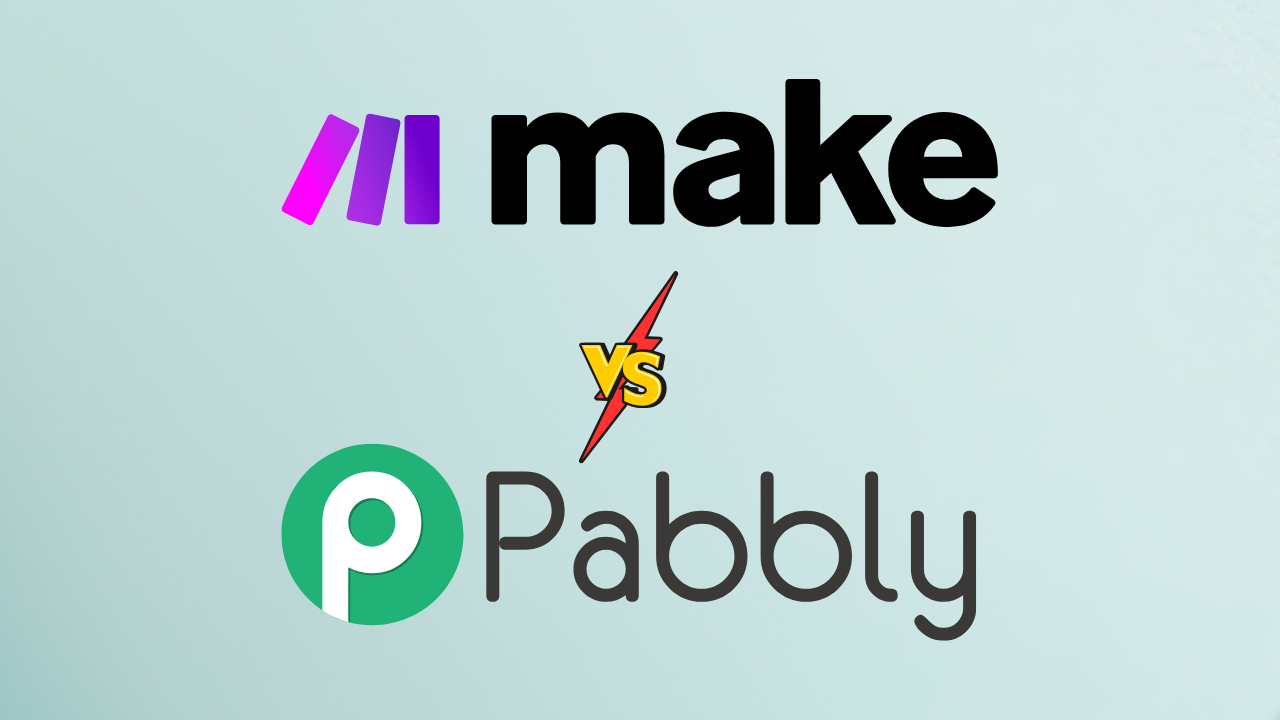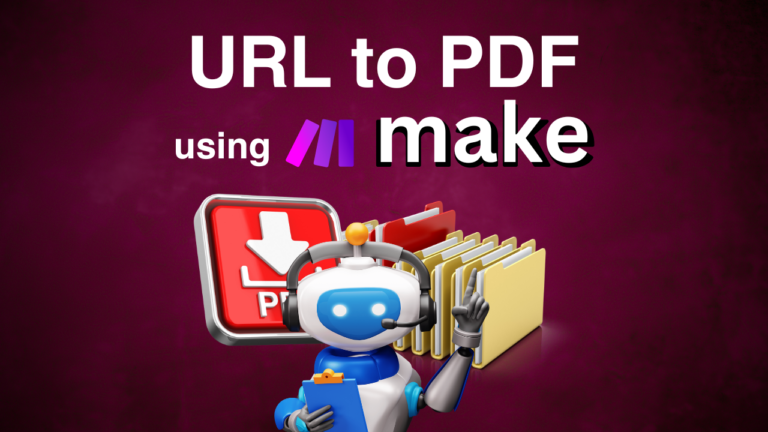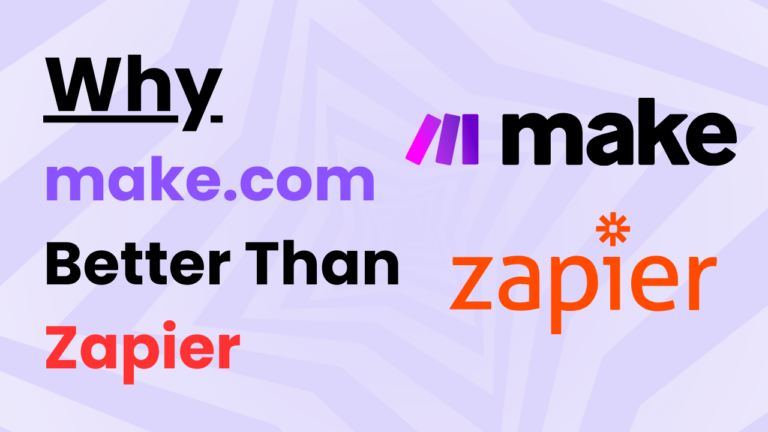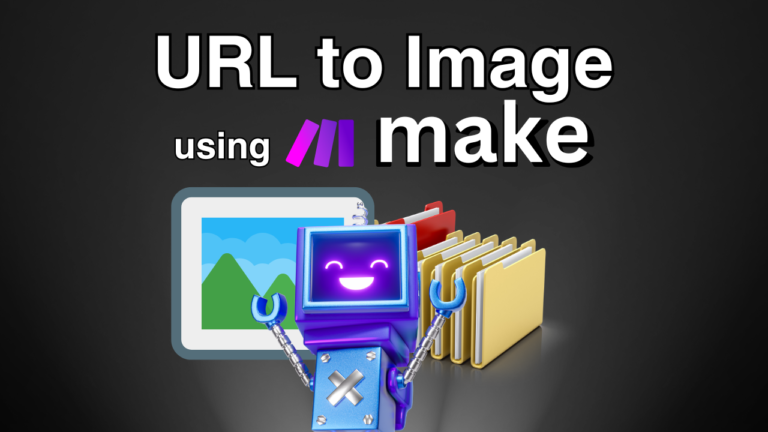Make.com vs Pabbly Connect: Guide to Choose the Best
Introduction
In today’s digital landscape, automation tools play a crucial role in connecting applications and streamlining workflows. Among the popular options are Make.com and Pabbly Connect. While both are effective in automating tasks, each has distinct features and capabilities that cater to different users and businesses. This article dives into the core differences between Make.com and Pabbly Connect, helping you determine which is best for your automation needs.
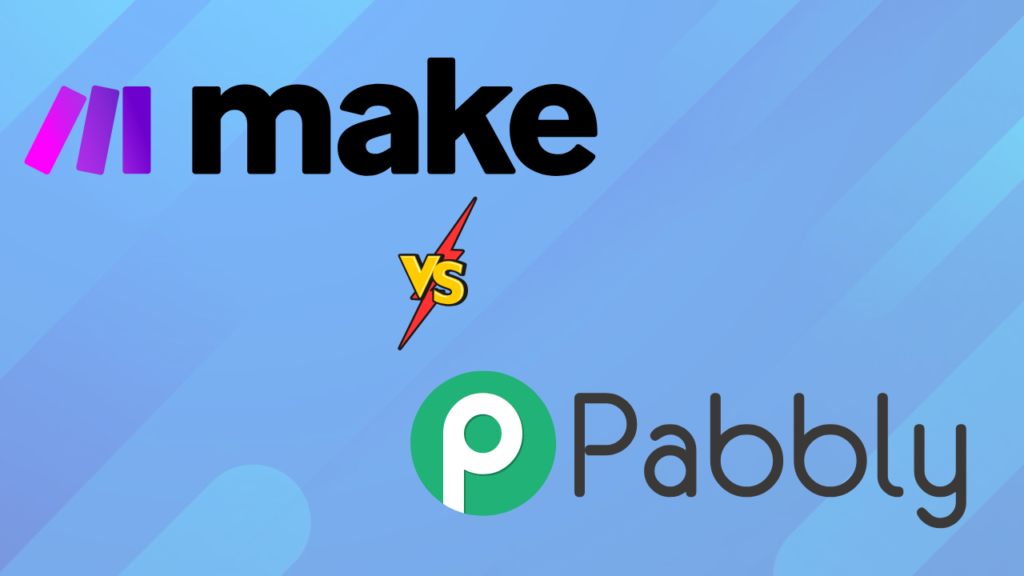
1. Overview of Make.com and Pabbly Connect
Make.com (formerly Integromat) is an automation platform known for its flexibility and visual workflow designer, allowing users to create complex, multi-step automations. Its features make it particularly suitable for users who need detailed control over each step in their workflows.
Pabbly Connect, on the other hand, is a more budget-friendly tool geared toward small to medium-sized businesses looking for straightforward automation solutions. Pabbly Connect supports various applications and is ideal for simpler automation without an extensive learning curve.
2. Workflow Design and User Interface
Visual Workflow Designer (Make.com)
Make.com offers a visual drag-and-drop workflow builder that allows users to map out complex scenarios with conditional logic, loops, and branching paths. This design enables users to see every step of their workflow and make real-time adjustments. For those needing to automate intricate tasks, this visual approach makes Make.com more intuitive.
Simple Workflow Approach (Pabbly Connect)
Pabbly Connect follows a more straightforward approach to workflow design. Its interface is less complex and easier for beginners, allowing users to set up basic automations quickly. While it doesn’t offer the same visual workflow builder as Make.com, Pabbly Connect’s interface is easy to navigate and suitable for users who prioritize simplicity over flexibility.
3. Integration Options
Wide Range of Integrations (Make.com)
Make.com provides integrations for over 1,000 applications, including many that support custom API integrations. This allows users to connect with both popular and niche applications. For businesses requiring tailored integrations with specialized apps, Make.com offers the flexibility to connect any API, making it a versatile solution.
Application-Specific Integrations (Pabbly Connect)
Pabbly Connect also supports numerous integrations but has a more limited selection compared to Make.com. It connects well with popular applications across e-commerce, CRM, and marketing categories, making it suitable for general business processes. However, it may lack the extensive API integration capabilities that Make.com provides, which could be a limitation for businesses with specialized needs.
4. Customization and Advanced Features
Data Manipulation and Advanced Logic (Make.com)
One of Make.com’s strengths is its powerful data manipulation capabilities. It allows users to perform complex data transformations, calculations, and apply conditional logic within scenarios. Make.com supports features like branching paths, iterations, and variables, enabling users to create sophisticated workflows that handle complex data processing needs.
Basic Data Handling and Automation (Pabbly Connect)
Pabbly Connect offers simpler data handling options, which can be more approachable for beginners. However, it lacks some of the advanced customization features of Make.com. Pabbly Connect focuses on straightforward automations, which works well for standard tasks like transferring data from one app to another but may be limiting for users needing complex data processing and branching logic.
5. Pricing Models
Pay-Per-Use Flexibility (Make.com)
Make.com follows a pay-per-use model where users are charged based on the number of operations (i.e., actions or steps) their workflows execute. This pricing model can be advantageous for users with fluctuating automation needs, as they only pay for what they use. However, it may be less ideal for businesses with high-volume automation requirements due to cost variability.
Affordable Fixed Pricing (Pabbly Connect)
Pabbly Connect stands out for its budget-friendly pricing, offering a fixed monthly or annual fee without usage limits on the number of automations or tasks. This pricing model is attractive for small businesses or users with high-volume automation needs who want predictable costs. Additionally, Pabbly Connect has a lifetime deal option, making it one of the most cost-effective automation solutions available.
6. Error Handling and Support
Detailed Error Reporting (Make.com)
Make.com provides comprehensive error handling with detailed logs that help users identify exactly where an error occurred in a workflow. This feature enables quicker troubleshooting and makes it easier for users to adjust their scenarios to ensure reliability. Make.com also offers version control, allowing users to revert to previous versions of workflows if needed.
Basic Error Logs (Pabbly Connect)
Pabbly Connect offers basic error logging and notifications but lacks the in-depth error handling capabilities of Make.com. Users receive alerts when errors occur, but troubleshooting may be more challenging without detailed logs. For simpler workflows, this level of error handling may be sufficient, but users with complex scenarios may find Make.com’s error reporting more beneficial.
7. Collaboration and Team Management
Advanced Collaboration Tools (Make.com)
Make.com is designed for team collaboration, providing tools to manage roles, share scenarios, and monitor team activities. This setup is ideal for larger businesses or collaborative teams who need organized workflows and role-specific permissions.
Limited Team Features (Pabbly Connect)
Pabbly Connect has limited collaboration features, as it is geared more toward individual users or small teams. Although multiple users can access the account, it lacks the team management tools found in Make.com, which can make workflow organization challenging in multi-user environments.
Conclusion
Choosing between Make.com and Pabbly Connect ultimately depends on the complexity of your workflows, your need for customization, and your budget. Make.com excels in its visual workflow design, advanced data handling, and customization options, making it ideal for users who require detailed control and flexibility. It is well-suited for medium to large businesses or tech-savvy users handling complex automations.
Pabbly Connect, however, provides a simpler interface and a more affordable pricing model, which is ideal for small to medium businesses or those with standard automation needs. Its straightforward approach and cost-effective plans make it an excellent choice for businesses on a budget looking to automate basic workflows without extensive setup.
By understanding these differences, you can select the automation platform that best aligns with your goals and automation requirements.
Also Read – Why Make.com Better than Zapier

